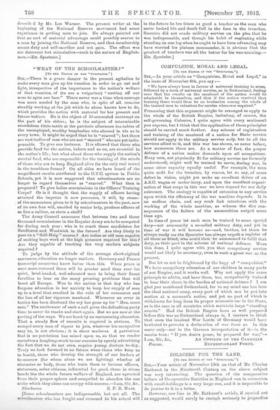COMPULSION, MORAL AND LEGAL.
rTo THE EDITOR Or Tns "EPEcTATOIL."1
your article on " Compulsion, Moral and Legal," in the issue of November 6th, you say 1— " We have always been in favour of universal training to arms, followed by a term of universal service, as in Switzerland, feeling sure that the results on the manhood of the nation would be admirable in themselves, and that if the nation received that training there would then be no hesitation among the whole of the trained men to volunteer for service whenever required."
Presuming that this argument might be arranged to apply to the whole of the British Empire, including, of course, the self-governing Colonies, I quite agree with every sentiment you express, but I think that the application of these principles should be carried much farther. Any scheme of registration and training of the manhood of a nation for State service should not apply to the military service only, but to all the services allied to it, and this war has shown, as never before, how numerous these are. As a matter of fact, the proper defence of a nation makes demands upon all occupations.
Many men, not physically fit for military service as formerly understood), might well be trained to serve, during war, in some other capacity equally useful. For example, the man quite unfit for the trenches, by reason, let as say, of some defect in vision, might yet make an excellent driver of an A.S.R. wagon or motor-lorry, and upon the excellent organi- zation of that corps in this war we here depend for our daily existence. The analogy is capable of extension to any service upon which the efficiency of the war machine depends. It is an endless chain, and any weak link interferes with the working of the whole machine, us witness the dire con- sequences of the failure of the ammunition output some time ago.
In time of peace let each man be trained to some special duty—not necessarily a so-called military duty, and yet in time of war it will become so—and, further, let there be always ready (as the Spectator has always urged) a register of all those so fitted, who could then be aunt moned to fulfil that duty, as their part in the scheme of national defence. Were this done, I quite agree with you that compulsory service would not likely be necessary, even in such a great war as the present.
But let us not be frightened by the bogy of "compulsion" We have compulsory education of our children in many parts of our Empire, and it works well. Why not apply the samo principle to adults, and have them, too, compulsorily trained to bear their share in the burden of national defence P I am glad you mentioned Switzerland, for to ray mind one has hero the ideal national army, every part of which can be put into motion at a moment's notice, and yet no part of *hie!' is withdrawn for long from its proper economic use in the State, as is the case in all countries which maintain large "standing armies." Had the British Empire been as well prepared before this war as Switzerland always is, I venture to think that even the insolent War Lords of Germany would have hesitated to provoke b. declaration of war from us. In this sense only—not in the German interpretation of it—is the maxim true : " If you desire peace, be prepared for war."---
I am, Sir, arc., AN OFFICER OF THE CANADIAN France. EXPEDITIONARY EORCE,






































 Previous page
Previous page